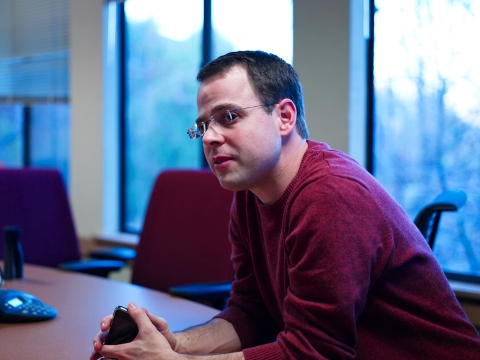Apple: When ‘Fans’ Are Simply Bribed, Too
Summary: Another good example of paid-for Apple ‘fans’
THE CULT of Apple is not as organic as one might be led to believe. In the past we covered examples of Apple AstroTurfing and this new example shows us paid queue standers — people who are paid to hype up products:
Airtasker paying man to queue to buy the very first new iPad
STEPHEN Parkes is first in line for a new iPad at the Apple store in Sydney but it’s not because he actually wants one.
Instead jobs site Airtasker is keen to cash in on Apple’s cachet has paid the former truck driver $950 to wait there until Friday’s launch wearing a T-shirt emblazoned with its logo.
Airtasker.com is an online marketplace where people can bid for the right to earn cash for running day errands and completing everyday chores.
This is ridiculous. Sometimes celebrities are used like this too — a form of deceitful endorsement. Apple also gives the illusion/delusion of its products being the most wanted by providing ‘i’ Prizes in all sorts of competitions and raffles. It’s effective PR.
Now, consider the fact that Novell keeps losing its free (voluntary) fans despite pretending to be “open” and soon enough it’s realised that a lot of this is plain marketing for Microsoft-taxed GNU/Linux like this SP2, which oddly enough was picked for review:
SLES 11 SP2 adds a new kernel, support for Btrfs and LXC, and Snapper to manage snapshots and rollbacks. Koen Vervloesem explains all…
Was the author contacted by Novell/SUSE to write this review? We saw Novell doing this before and even offering gifts for it. This is a subject for another day. █
Mozilla and Others Still Lead Opposition to Software Patents
Summary: Software patents disdain as seen in this week’s news
THE backlash against software patents is very clear to see. With matrices as monopolies I am unable to do my work, at least not peacefully or without worries about taking it out there to market. Mike Masnick explains “Why It’s Mathematically Impossible To Avoid Infringing On Software Patents” and he makes some good points, as usual. Mozilla, meanwhile, struggles with codec monopolies, which are also all about maths — some of which controlled by MPEG-LA. Ryan from our IRC channels wrote about the subject in a better way than most did (including another Ryan, from Ars Technica):
Microsoft and Apple, which are also criminal cartels, are also members of the MPEG-LA, and are trying to wipe out the open and unencumbered VP8 and Ogg Vorbis combination known as WebM by refusing to support it in Safari and Internet Explorer.
Mozilla and Opera have so far not implemented MPEG codecs because they would be gouged by the MPEG-LA’s innovation tax.
The problem for the user, which is caught in the middle, is that sites that are out there today and insisting on MPEG-4, such as Vimeo, won’t work in Firefox or Opera in HTML 5 mode, and require the proprietary binary blob with gazillions of security problems known as “Adobe Flash” to play their content.
Mozilla is not proposing to ship the offending codecs themselves, but to just use the ones on the system, if any. On Windows, they can hook into DirectShow, on OS X they can hook into Quicktime, and on Linux they can hook into and use anything Gstreamer can play. Of course Android, iOS, and Windows Phone (with all three people who have one) all have their own media codecs.
Despite recent mistakes, Mozilla’s opposition to software patents and to MPEG-LA (there is adherence to free codecs) was covered here before. Mozilla is truly a proponent of Open Source, unlike Google with Chrome. Here is a new video campaign from Mozilla:
Taking the message to its users, Mozilla launched a user-generated video contest to help educate how its open-source browser, Firefox, differs from the pack.
“Browsers control what’s possible on the Web,” said Mozilla CMO Chris Beard, who joined the company just prior to the Firefox launch about seven years ago. “There is a lot of commercial interest vying for that control.”
Beard called Mozilla’s strategy “grassroots,” noting that the ad campaign should be seen as an extension of the company’s strategy. About 2 million people try Firefox daily around the world. The browser supports about 400 million users.
Tim Lee, another one from the “Open Source”/pro-sharing team, explains the idea of patent reform and addresses misconceptions in a skillful fashion:
But the more important point is that, in fact, the patent office does a really bad job at searching for prior art. In the famous patent episode of This American Life, they ask M-CAM to analyze a particular patent to see if similar concepts had been patented before. As I recall, they found the same concept had been patented dozens of times. Indeed, I’ve read that in the early years of the Internet, patent examiners were actually prohibited from using the Internet to search for prior art—even for patents related to Internet technologies.
[...]
The problem with tracking “the patents owned by your competitors and the trolls” is that you don’t know who the trolls are, or which patents they hold, until one of them sends you a cease and desist letter. There are at least two reasons for this. First, there’s no centralized registry of patent ownership, so while it’s easy to tell who was initially granted a patent, there’s no reliable way to tell if a particular patent has been sold to someone else. Second, legitimate companies regularly sell patents to trolls, or become trolls themselves. And even if you could somehow overcome these two obstacles, there are enough trolls out there now that even searching through troll-owned patents would be a serious burden.
In any event, software firms really do ignore patents when designing new products. You should read Mark Lemley’s excellent paper on the subject if you don’t believe me.
Software patents really need to go away. Nobody wants them except monopolies and patent lawyers. █
Patents Roundup: Android/Linux, Yahoo!, and More

Summary: A roundup of notable news about software patents
THE fight against Linux/Android meets an impasse as certain vital patents lose their teeth.
“Trial is set for April 16 in Oracle v Google and the list of patents Oracle is claiming have been violated is now gutted,” notes Pogson.
Over at Groklaw, where Professor Webbink does a lot of research, the details are made clearer for the common person:
Judge Alsup is ready to get on with it, and to that end he has set this case for trial beginning April 16, 2012. (786 [PDF; Text]) He is anticipating an eight week trial, which will be brutal on the jurors. To that end the potential jurors will be pre-cleared to assure their availability. The judge has also asked Google to withdraw those invalidity arguments it has asserted in reexmination that have not been adopted by the USPTO. Clearly, he does not want to hear them.
What set the stage for the trial to move forward was the Court’s decision on Dr. Cockburn’s third attempt at a damages report. (785 [PDF; Text]) And like they say in baseball, “Strike three!” Actually, the Court did not reject all of the third attempt, simply most of it and certainly all of the parts of it that most troubled Google.
Copyright might be all that Oracle is left with. After reportedly retreating from patents, this might be it. And it’s a weak case, just like SCO’s.
Simon Phipps from the OSI says that the “software patent war escalates” and in new blog post that includes this:
The Software Patent War Escalates
[...]
The people doing this advocacy used to work for industry consortia like the BSA, but increasingly they are twice removed from them to avoid easy connections being made. Politicians and civil servants may be unable to identify the links back to industry in these cases, and are consequently surprised when opposition appears as if from nowhere. They are being told by whisper campaigns that powerful newcomers like Google are behind this opposition.
It’s taking quite some time for the realisation to dawn that the opposition to draconian and toxic escalations to copyright and patent law is not being orchestrated by any corporation. Rather, the connected society is providing a voice for citizen consensus, perhaps for the first time since ancient Athenian democracy. Thank goodness for that openness; no wonder lobbyists and paid consultants are working to limit that too.
Simon Phipps wrote the above in light of the patent attacks from Yahoo! — those which we covered here before. And even the patent authors — like those from Sun whose patents were later used by Oracle against Android — denounce this course of action:
Now, I’ve always hated the idea of software patents. But Yahoo assured us that their patent portfolio was a precautionary measure, to defend against patent trolls and others who might try to attack Yahoo with their own holdings. It was a cold war, stockpiling patents instead of nuclear arms, and every company in the valley had a bunker full of them.
Against my better judgement, I sat in a conference room with my co-founders and a couple of patent attorneys and told them what we’d created. They took notes and created nonsensical documents that I still can’t make sense of. In all, I helped Yahoo file eight patent applications.
Years after I left I discovered to my dismay that four of them were granted by the U.S. Patent and Trade Office.
I thought I was giving them a shield, but turns out I gave them a missile with my name permanently engraved on it.
Here is more about this case. Yahoo! has officially sued and many Yahoo! employees are reportedly pissed off about it. Unwise move. █
American Protests Form Against the Gates Foundation
Teachers fight against walls and Gates

Summary: Citizens of the United States — not just people in the developing world — take it to the streets in protest against Bill Gates and his scheme
THE FOLLOWING new report [via metacode] shows that backlash against the Gates Foundation is growing and there are now protests as well. It is reassuring to see that people no longer take at face value everything the commercial media is spewing (because Gates is literally funding a lot of it). There is clearer understanding of what Gates is trying to achieve and how:
The chants of some 150 teachers, students, parents and Occupy Seattle activists reverberated off the windows of the global headquarters of the Bill & Melinda Gates Foundation – a leading promoter of a corporate brand of education reform—announcing we were ready for our scheduled debate about the schools as part of a national call to “Occupy Education” on March 1st.
We’ll return to covering this another day. █
TechBytes Will Resume

Summary: Quick update about the audio/video show of OpenBytes and Techrights
SOME people sometimes ask us (in IRC or in social networks) what has happened to TechBytes. Well, nothing has happened, it’s just that Tim and I have not had much free and quiet time recently. This weekend I am going to Tim’s house (I was there last month too, this weekend I become the godfather of his daughter) and I realise that background noise is a real barrier, so we might have to wait a few more weeks and see how to overcome this barrier. Young children don’t help this and now that I’m engaged it might not get any easier.
Meanwhile, a show called Crivins, one with Gordon Sinclair (who used to be with TechBytes), is gaining steam and although TechBytes will definitely resume, the other day I took part in their ninth episode. Those who want to tune in are going to find even more Scottish accents there. █



















 Content is available under CC-BY-SA
Content is available under CC-BY-SA